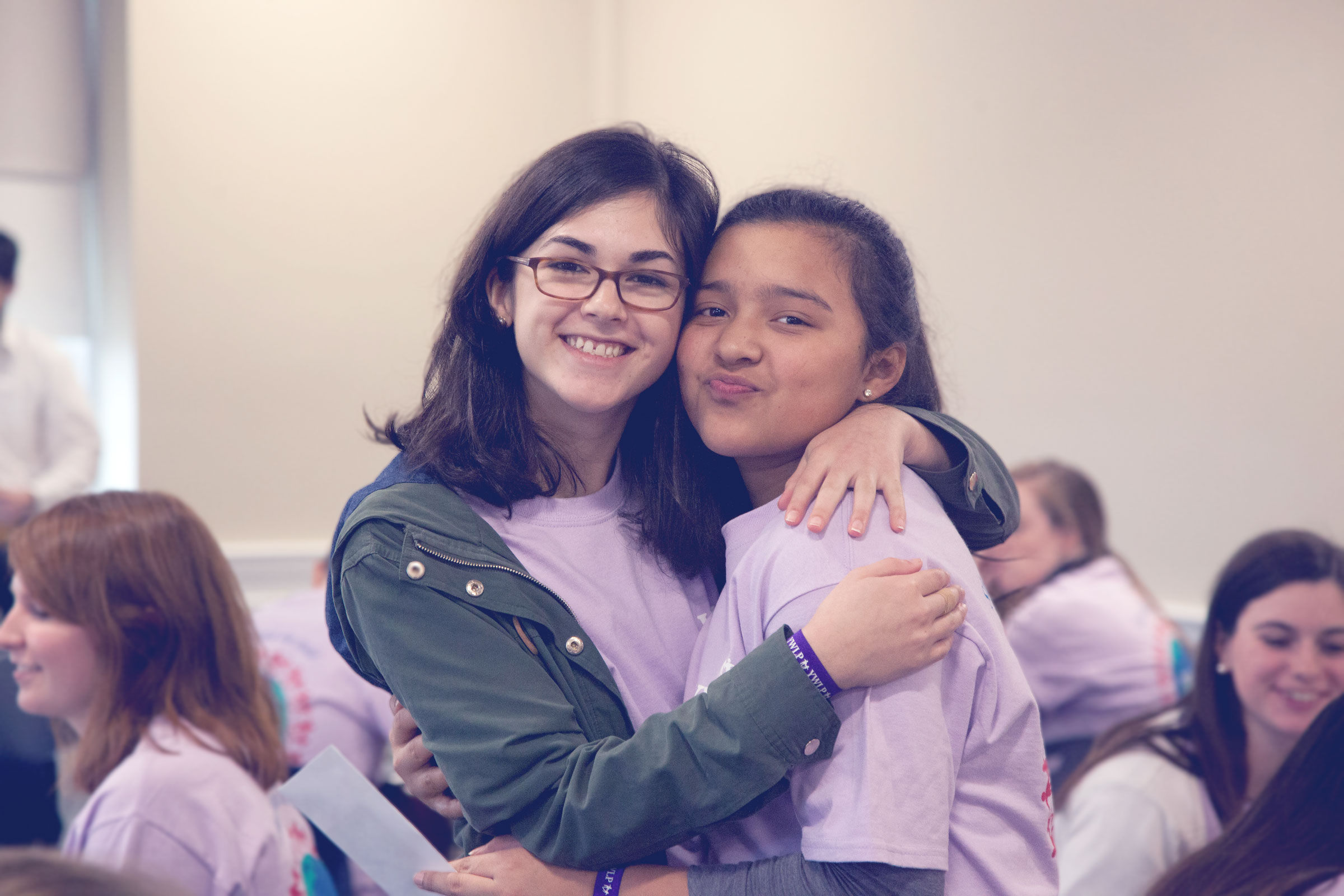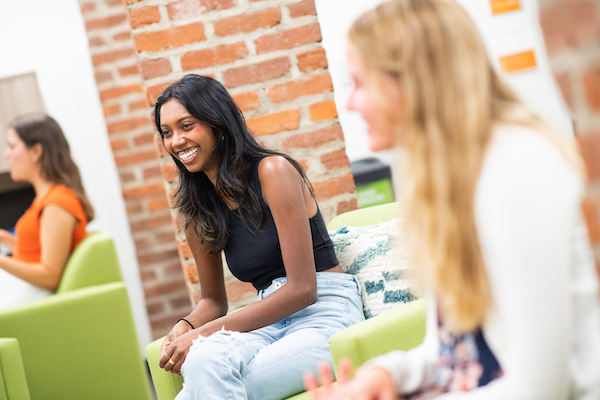
Anna Cordle, a 2015 graduate of the University of Virginia’s Curry School of Education, wanted to connect with the local school population in a meaningful way. What’s more, she wanted to work with middle-school girls, a population that can be at risk for low self-esteem during the often-awkward transition from elementary to middle school.
She got that chance because of UVA’s popular Young Women Leaders Program. Cordle was a big sister in the program and felt like she got as much out of her mentorship role as her “little sister” did.
“It forges a connection between the university world and the middle school life,” Cordle said. “It breaks that wall down and takes big sisters out of that college bubble at least once a week, which is really important.”
Keyri Lopez-Godoy, now a student at Eastern Mennonite University, participated in the program as a middle school student. She credits the program for her interest in building deeper, more meaningful relationships.
“I will always be thankful to the Young Women Leaders Program for the sister they paired me with, and for the investment they made in me to see that I had the potential to be a leader,” Lopez-Godoy said. “I learned that things are about perspective and having the right people in your life; I learned that to be cared for and supported I did not need to have hundreds of friends, but I only needed one to make a difference.”
Get Out of Your Bubble
It is said so often on college campuses that it’s become cliché: “Get out of your bubble,” referring to the short-term situation that isolates students from reality. The true nature of the world cannot be taught entirely in a classroom.
While many UVA community outreach programs aim to get students out of their bubbles, one innovative youth-mentoring project at UVA did it by designing a yearlong opportunity for female students to link academics with structured and supported engagement with area youth.
For the past 20 years, the Young Women Leaders Program, a joint effort between the Curry School of Education and the Maxine Platzer Lynn Women’s Center, has linked girls from four middle schools in the Charlottesville area with mentors who are UVA undergraduate students. In that time, the program has served more than 1,500 pairs of middle school girls and college-aged women.
“The program is a success because while you’ve got these age differences, they’re going through the same stuff,” said Jaronda Miller-Bryant, the program’s associate director. “Both have issues around identity, body image, dating – all of that. The relationship offers an opportunity for them to learn from each other.”
Designed to enhance the self-esteem and leadership skills of both the participating UVA college women and their middle school “little sisters,” the program has grown to be so much more. The model has expanded to 10 national sister sites and four international sites, and has become a bastion of research on youth development and best practices in mentoring.
Meeting the Mentoring Challenge
A hallmark of the Young Women Leaders Program is its incorporation of mentoring best practices, training, coursework and research to ensure relationships between vulnerable middle-school girls and high-achieving college women thrive.

“There are a lot of programs that say, ‘sign up to be a mentor,’ but there’s no real accountability for how much you stay engaged with that mentee,” Miller-Bryant said. “Our program provides built-in accountability and support and it diminishes the possibility that a mentor is going to not know how to handle a sticky situation with a mentee.”
A college woman who decides to be a mentor through the program agrees to commit five hours a week of work to her mentee. In addition to one-on-one time, groups of six to eight pairs of mentors and mentees meet together two hours a week after school to discuss issues like women’s representation in the media and relational aggression. The mentors also take a concurrent three-credit college course on adolescent development and best practices in mentoring, which provides insights into their mentees’ behaviors as well as support for difficult situations.
This approach is unique both for the ongoing nature of the training and its focus on the developmental needs of the mentees, said Edith “Winx” Lawrence, a professor of education and director and co-founder of the program.
“Parenting a middle school girl can be hard, so why wouldn’t mentoring one be hard?” she said. “Girls this age tend to roll eyes and suck teeth when they don’t like something; it can be difficult to stay engaged in a relationship during these times. We wanted to give [mentors] a level of training and support that enabled them to successfully navigate these relational challenges with their mentees.”
Researching Relationships
With each new piece of curriculum, the program brought UVA students out of their bubbles of academic abstraction and into the tangible worlds of local girls. Yet even this required research to see if it worked. Was the program actually building participants’ confidence, connection and autonomy? Or were the planned activities just fun?
Starting in 2004, research led by Curry School faculty members Nancy Deutsch, Joanna Lee Williams and Winx Lawrence (supported by grants from the U.S. Department of Education, the W.T. Grant Foundation and the U.S. Department of Justice Office of Juvenile Justice and Prevention) looked at how successful the program has been at supporting positive development for both the middle school girls and college women.
The most unexpected result of these studies was how both the mentors and the mentees grew in their appreciation for difference and in their ability to understand relational resilience, which is the ability to make a relationship last.
This occurred even though most of the girls were not friends prior to joining the mentoring program. The middle school girls nominated for the program include girls from different peer and cultural groups within their schools. Similarly, the mentors in the Young Women Leaders Program are recruited from across disciplines and often do not know each other. The mentoring group format brings them into contact with both girls and other college students with whom they may not have otherwise interacted.
“When we interviewed girls and mentors about their experience, we heard themes around this idea of discovering that you could be friends with people you didn’t think you could be friends with, because you thought you never had anything in common,” Deutsch said.
The importance of helping mentors and mentees establish strong and effective relationships despite challenges was a second interesting finding of the program’s research.
“Difficulty and conflict in relationships are normal,” Deutsch said. “It’s not about not having moments of difficulty or disconnection or conflict, it’s about, ‘How do you recover from those?’”
“From our research we have identified five mentoring competencies we believe mentors need in order to develop and sustain an effective relationship over time,” Lawrence noted. “These competencies are a positive attitude, collaboration, empathy and attunement, initiative and persistence and basic mentoring knowledge. We hypothesize that as the mentors develop and model these skills, their mentees learn them as well.”
Based on this, the Young Women Leaders Program has focused the curriculum over the years on providing opportunities for mentees and mentors to reflect on and practice these relational skills.
Research suggests it is paying off.“When the middle school girls were interviewed about their experiences in the Young Women Leaders Program, they didn’t talk about academic change much at all, but they talked a lot about changes in their personal relationships, particularly around being able to trust people more and developing relational skills,” Deutsch said.
The mentoring program also makes a long-term impact on its participants. “Some of the ‘bigs’ still talk to their ‘littles’ on Facebook, 20 years later,” Miller-Bryant said.
In a recent survey of program alumnae, more than 1,000 women, some now in their 40s, talked about how it taught them about diverse communities and having confidence as a leader. Perhaps the most applicable skill for getting out of bubbles is this one: the ability to build lasting friendships with those who are different from you.
The Future of the Young Women Leaders Program
Some of the undergraduates in the program have been so moved by their experience in the program that they’ve used Jefferson Public Citizen grants to start “sister sites” in Cameroon, Nicaragua, Ecuador and Nigeria. In addition every year, the program chooses an UVA undergraduate as a global intern to visit one of the sister sites and learn firsthand about the issues women around the world face.

“In multiple ways, the program gives students a way of thinking and approaching what they’re doing while they’re here and beyond – working in partnership with others and recognizing that they have so much to learn from everyone they encounter – which is different from what they would typically get in just the classroom or just a volunteer program,” assistant director Melissa Levy said.
Youth programs come and go, but leaders in the Young Women Leaders Program hope the resilience they teach their mentors and mentees applies to their program as well. “It offers so much to both the college women and middle school girls. I hope it can continue for another 20 years,” Lawrence said.
The Young Women Leaders Program unites people across divides. It teaches participants collaboration, empathy, initiative and perseverance, real-world skills that are fundamental to relationship building across differences. And isn’t that’s what getting out of a “bubble” is all about?

